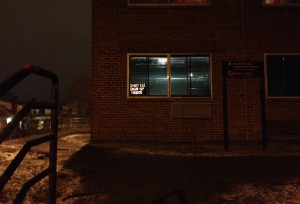I had the pleasure, a week ago, to attend an intellectually stimulating and engaging lecture on education in China and the U.S. by Yingyi Ma, an Assistant Professor of Sociology at Syracuse University and a great public speaker. Firstly, the attendance rate exceeded expectations as students and professors from the School of Education joined Maxwell students in an average-size Egger’s Hall room. Given that I was one of the the people responsible for arranging for the event, I had to run around at the beginning of the lecture, and with the help of a friend, gathered a dozen more chairs for the overcrowded room.
The lecture was on the differences of the educational systems of the U.S. and China and how they affect the testing scores of students in those two nations (but the discussion also included other countries like India and Singapore). The presenter argued that those two countries can learn a lot from each other’s systems. She argued that the U.S. system encouraged innovation and creativity while China’s system valued handwork and practice. She recognized that there is a “math-phobia” among U.S. students. She interviewed Chinese students studying at SU and noticed that they had no trouble in science and math because it was easy for them, but struggled with participation and language. She also noticed that the opposite pattern was present with American students. She suggests that the U.S. educational system should build greater emphasis on math and sciences and encourage students to practice and be patient with challenging subjects, and that China’s system should encourage and celebrate student participation.
To me, the most remarkable statement the speaker made was on the great difference between the hours American students spend studying compared to the hours Chinese and Indian students spend studying per week. This reminded me of my childhood growing up in a developing country. There was nothing more important to my parents than education. For better or for worse, my siblings and I grew up believing that the key to other’s approval was excelling in school. And if you think about it, this is the mentality expat parents living with no real social security nets had to instill in their children to ensure their survival. I remember spending most of my weekdays and weekends studying. However, once I enrolled in university (an American university) the workload, albeit stressful, was nothing compared to that of high school. Nonetheless, the difficult high school years were necessary evils. They were the years that determined a kid’s future. Those were also the years that made me the student I am today. Had my high school not been so harsh, I don’t think I would have performed as well in higher education.
While this particular lecture was on Chinese vs. American educational systems, I think there are things that American and Chinese educators can learn from other countries’ educational systems. Namely some european and middle eastern educational systems (many of my middle eastern colleagues might laugh this off but they would be missing a vital point). In regards to middle eastern students, some would notice (and I don’t mean to come off arrogant here) that they excel in second languages. In fact, it is not uncommon to meet middle eastern students who are fluent in three languages, simply because they have been taught these languages since elementary school. While many nations take pride in their own languages and consider teaching children other languages a sign of national defeat and weakness (to their historical oppressors and colonizers), it never seemed to me that knowing more languages was a disadvantage in this globalized world. In any way, that is something worth reflecting on.
